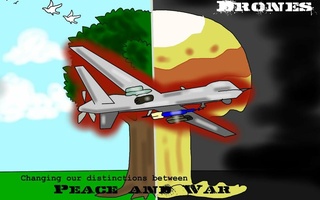When President Bush unveiled his first budget on Monday, some socially conscious people were probably disappointed to see that military spending rose by $14 billion to an astronomical $310.5 billion. But they should not be disappointed. We need to spend more money on the military. Much more. Perhaps on the order of tens of billions of dollars.
The increase, however, should not go toward buying more stealth bombers, designing a new battleship, or developing some fantastical missile defense system. Instead, the money should be used to create a new branch of the armed forces—a permanent peacekeeping force.
The force would be a standing army of troops trained in the arts of humanitarian relief and peacebuilding. In some regards, it would function like our existing branches of the armed forces—just as young Americans can choose to volunteer for the Army, Navy, Air Force or Marine Corps, they would now have the option of serving in the peacekeeping force. However, unlike the other armed forces, instead of blowing up things and people, the peacekeeping force would specialize in providing safe havens from genocidal armies, escorting refugees, and rebuilding civil societies.
The creation of a permanent peacekeeping force would acknowledge the fact that the nature of warfare is changing. In the Cold War, most military confrontations were strategic stand-offs between the world’s superpowers. Now, most armed conflicts are ethnic civil wars in small countries. And unfortunately, the primary aim of this new warfare has been to inflict as much misery as possible on the civilian population of the other side, as demonstrated by the civil wars in the Balkans and Rwanda.
Sometimes, the international community tries to intervene and sends its armies on peacekeeping missions. Other times, the world sits idly during a genocide, as when one million civilians were slaughtered in Rwanda. But even when the international community does act, it never does so in time—in Kosovo, hundreds of thousands of ethnic Albanians were already raped, maimed or murdered before NATO rose to the occasion.
The problem is two-fold: for all of the atrocity in the world, the international community sends in peacekeepers only a fraction of the time, and the peacekeeping missions that do happen are undertaken by regular soldiers—who are trained at killing and not peacekeeping—and so these missions are typically mired by inefficiency. A permanent peacekeeping force would address the first problem and it would solve the second.
Part of the reason why our leaders are so reluctant to send our soldiers on peacekeeping missions is because they are typically unsuccessful. Consider the case of Somalia in 1993, where American soldiers were brought in to subdue the tribal warfare that had brought the country to the brink of famine. Not only did the American troops fail in their peacekeeping mission (to deliver food to civilians and stem the violence), but they also succeeded in offending the Somali people through their brazen disregard for cultural mores and practices.
The creation of a permanent peacekeeping force recognizes that there are fundamental differences in peacekeeping and soldiering. Members of the peacekeeping force would not just be trained in tactical warfare, but they would also be taught how to best serve the people whom they were protecting. Countries such as Canada already require that peacekeepers attend lectures on the host country’s history and customs before sending them on their mission. Preventing conflict and assisting civilians requires a completely different set of skills than killing and destroying. You do not send a butcher to do a surgeon’s work; you should not send a soldier to do a peacekeeper’s.
Read more in Opinion
Grafton, We Hardly Knew YeRecommended Articles
-
An Isolated InterventionistWhen I took Literature and Arts B-33: "Frank Lloyd Wright and Modern Architecture" last semester, we studied the United Nations
-
Don't Abandon Sierra LeoneIn Sierra Leone, the situation is getting worse. A country torn and ravaged by a nine-year civil war, Sierra Leone
-
Editor's Notebook: The Sacred Duty of Copping OutNow that it’s clear our troops will not be diddling about the scenic foothills of Macedonia, keeping the peace or
-
 Weapons of Peace?
Weapons of Peace? -
UN Human Rights Chief Calls for Peacekeeper AccountabilityAt the Institute of Politics, Zeid Ra’ad Al-Hussein, the United Nations’ high commissioner for human rights, called for more accountability for UN peacekeepers, a number of whom face accusations of sexual exploitation and assault













